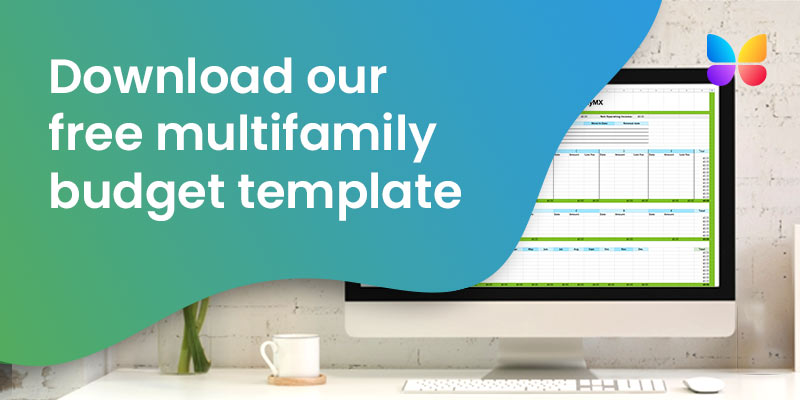Key takeaways:
- A property management budget is a comprehensive financial plan that details both income streams—like rent and ancillary fees—and expenses to guide a multifamily property’s fiscal performance.
- Accurate forecasting of income (including rent increases, lease renewals, and additional fees) and expenses (operating costs, capital expenditures, and marketing investments) is essential for realistic budgeting.
- Calculating net operating income by subtracting operating expenses from gross operating income provides a clear metric to assess property profitability and plan future investments.
- Developing multiple budget scenarios based on varying market conditions enables property managers to prepare for best- and worst-case outcomes, ensuring long-term competitiveness and financial stability.

Every year, late summer marks the start of budget season for the real estate industry. During these months, multifamily professionals work diligently to prepare a property management budget for the upcoming year. These annual operating budgets track income and expenses. And they cover everything from new large-scale additions — such as adding new apartment amenities — to general maintenance to the building or common areas.
Whether you’re new to the industry or a seasoned professional, it’s always a good idea to refresh your knowledge on property management’s meaning and improve your multifamily budgeting skills. So, read this guide to learn more about your property management budget, what should go into it, and tips on how you can successfully create your multifamily operating budget.
Navigate this guide:
- What is a property management budget?
- Why you need to create an apartment operating budget
- What goes into an annual operating budget?
- How to build your property management budget
What is a property management budget?
A property management budget is a breakdown of the building’s income and expenses, used to track a multifamily property’s finances and plan future spending. Property managers usually prepare their apartment building’s annual operating budget a few months before the upcoming fiscal year.
A multifamily property management budget details the building’s daily operations, including both income and expenses. It also includes projections for the building’s expected expenses and income.
What is the purpose of an operating budget for a property manager?
The purpose of an operating budget for a property manager is to plan for the fiscal year ahead. Your budget serves as a guide for the building’s financial performance moving forward.
Consider why you might create a budget for your personal finances: to achieve financial goals, plan for building investments, and save more than you spend. Similarly, you should create a multifamily property budget to ensure that your property spends money wisely and performs as expected year after year.

Why you need to create an annual operating budget for your multifamily property
Property management budget planning is crucial to your building’s success because it will help you scale efficiently and improve year over year.
Here’s why you need to create an operating budget for your multifamily property:
- Set and meet goals: By setting a budget, you’ll create performance targets for your team. You’ll also have a metric by which to measure your success.
- Project income and expenses: As a property manager, you always have to be thinking ahead. Your budget projects expected income and expenses based on market assumptions and drivers, like job growth, migration, and interest rates.
- Set yourself up for success: Without a budget, you won’t know whether you’re positioned to meet expectations or underperform. But by setting an operating budget, you’ll know exactly where you stand so you can prevent problems before they arise.
- Continuously improve your building: There are plenty of things you can do to improve your property and the resident experience. These improvements ultimately boost your NOI. But before making large investments, it’s best to outline those expenses in your annual operating budget.
What goes into a property management budget?
There are numerous factors to consider when building an operating budget for any multifamily property.
Generally speaking, these factors can be broken down into two categories:

1. Multifamily property income
Every multifamily property shares at least one thing in common: collecting rent from residents. Those monthly rent payments account for the bulk of your building’s income.
But rent probably isn’t your only source of income. You may also receive forms of ancillary income.
Potential sources of ancillary income for multifamily properties include:
- Application fees
- Late payment fees
- Credit card processing fees
- Laundry
- Parking rent/fees
- Onsite vending machines, coffee bars, etc.
- Pet rent/fees
- Furniture rental
- Early lease termination fees
- Property damage fees
- Amenity access fees
When creating your annual operating budget, be sure to consider every source of income your property generates. This gives you an accurate picture of how much money your building brings in every month.
Gross operating income (GOI)
Your property’s gross operating income (GOI) is your total income, including rent and ancillary income. It’s the resulting figure when you subtract forecasted lost income (due to vacancies, incentives, etc.) from your gross potential income (GPI). Note: GOI is also known as effective gross income (EGI).
Your gross potential income (GPI) is your ideal revenue under perfect conditions. In other words, it’s the amount of money you’d be making if you didn’t have to account for inevitabilities like vacant units and credit losses.
So:
GPI – expected lost income = GOI
You can estimate expected lost income by analyzing data from previous years, as well as data from comparable properties.
Income projections
In addition to the income you already have records of, your annual operating budget should include income projections.
You should project income from things such as:
- Future rent increases: Do you intend to increase rental rates for new residents or those you retain?
- Filled vacancies: Do you expect a higher, lower, or a similar number of vacancies throughout the next year? Will you maintain the same average occupancy rate? Consider potential income from vacancies that are filled in the future.
- Fee increases: You can make more money by raising various fees. For example, you could raise the price of your community laundry by $0.50 or even $1.00.
- Projected lease renewals: Consider which of your current leases are likely to renew during the next fiscal year.
- New fees: Consider areas where you could increase income by charging new fees. For example, you could implement a new common area maintenance fee.
When projecting next year’s income, make note of your current vacancies and expected lease renewals. Use data to inform your projections for next year.

2. Multifamily property expenses
As you know, owning or operating a multifamily property comes with plenty of expenses. After all, how else would you keep the building up and running for your residents? There are three different categories of expenses to consider.
Operating expenses (opex)
Operating expenses (opex for short) are the costs associated with maintaining your property day in and day out. The higher your operating expenses, the more income you’ll need to generate.
Your operating expenses may include:
- Property taxes
- Maintenance for common areas and staff offices
- Insurance
- Contract services, such as janitorial, landscaping, and security services
- Supplies (such as office supplies, cleaning supplies, etc.)
- Utilities (including RUBS)
However, not all property-related expenses are considered opex — even if the owner or management company is responsible for paying them. For example, non-operating expenses could include capital expenditures, marketing and advertising costs, loan refinancing, and consultant fees.
Capital expenditures (capex)
Every building requires ongoing improvements to remain safe, modern, and desirable to tenants. Failing to stay on top of general upkeep prevents your building from remaining competitive, which results in reduced rent and a lower return on investment.
So, every building must budget for capital expenditures, which are large purchases or investments to improve the property and maintain its appeal to renters. Your property should budget for capital expenditures to cover large-scale replacements, expansions, renovations, and remodels.
Examples of capital expenditures include:
- Replacing HVAC systems
- Security or access control systems
- Installing or replacing elevators
- Building additions
- Adding amenities, such as a gym or rooftop deck.
- Remodels of units or common spaces
- Large-scale preventative maintenance
- Proptech systems
Keep in mind that capital expenditures can be capitalized. That means you can spread out the cost of the investment over the timespan of its useful life, or you can deduct the entire cost in the year of the expense. Depending on your situation, one or the other could offer tax benefits.
Watch how ButterflyMX works:
Marketing & advertising
No matter how wonderful your building may be, you won’t fill vacancies efficiently without marketing the property. And marketing isn’t free. So, your building needs to budget for marketing and advertising expenses.
Expenses to consider in your advertising budget include:
- Digital ads on social media, Google, and third-party websites.
- Print ads for local newspapers, magazines, flyers, and posters.
- Cost of gifts and “swag” for outreach marketing.
- Salary for content creators if you have a content marketing strategy.
- Cost to list your property on rental listing sites.
- Increasing your budget during periods of high vacancy.
How to build your property management budget
Once you’ve taken note of all your property’s income and expenses, it’s time to start fleshing out your annual property management budget. Having a firm grasp on your current expenses and income means you can now start budgeting for new investments and fresh ways to generate additional income.
To put together your budget, you can use property management budget software. Alternatively, you can use our free property management budget template. Input your own data into this spreadsheet to calculate income, expenses, and more.
Regardless of your process, you’ll need to do a few things beyond adding up your property’s operating expenses and income.
To create your property management operating budget, you must also:
Calculate net operating income (NOI)
Your annual operating budget helps you calculate net operating income (NOI).
Net Operating Income = Gross Operating Income – Operating Expenses
Keep in mind that the NOI you calculate with this formula is a pre-tax figure. It also doesn’t include capital expenditures, depreciation, or income taxes. So, be sure to calculate those and subtract them from your NOI. The resulting figure is your net income (NI).
Planning for new investments
As a property manager, you likely have tons of ideas for how to improve your building. Whether that’s adding a new video entry system or renovating your lobby with new floors, you’ve probably had your eye on a few solutions.
And budget season is the perfect time to thoughtfully consider new additions that would improve the resident experience, streamline operations for your staff, and increase your NOI.
So, take advantage of budget season to bring those ideas to life. Consider the most valuable investments you’d like to make and work them into your budget. This shows ownership that you’ve done your due diligence, and that you’ve thoroughly researched the cost and benefits of the products or services you want to purchase.

Preparing multiple versions of your property management budget
It might require some extra work, but smart property managers know to create more than one version of their annual operating budget. Each version should be created under different assumptions.
For example, prepare one budget assuming your rent rates increase while interest rates decrease, and a second budget assuming the opposite. This way, you’ll have options for best- and worst-case scenarios.
Navigate budget season with ease
Budget season can feel like a whirlwind of planning, researching, and calculating. But the work required to build your property management budget pays off.
Don’t forget to:
- Stay on top of what your competitors are doing so that your building remains competitive.
- Plan for all necessary renovations and improvements.
- Think about what new investments you should make to improve your building.
- Be as accurate as possible in your calculations to prevent issues from arising next year.
- Consider areas where you can increase income or add a new revenue stream.
With a concerted effort during budget season, you’ll have a thorough annual operating budget that will help you maximize income, spend wisely, and enjoy a profitable, competitive building.







